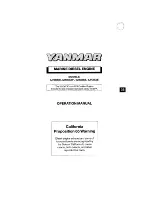
17.4
Adjustment of pressure control valves
Check the adjustment at intervals recommended in chapter 04.
Adjust the valves at normal temperatures with an idling engine,
i.e. the booster pump (9, Fig 17-1) running.
All pressures mentioned in the instruction apply to the readings
of the pressure gauge (5) in the instrument panel of the engine.
Turn the adjusting screws of the pressure control valves clock-
wise to achieve higher pressure, counterclockwise to achieve
lower pressure.
1 Adjustment of the valve (10) on the pump:
Raise the
pressure in the system slowly by closing the valve (14). Adjust
the valve (10) to 10 bar when the nominal pressure is 5 - 7 bar
and to 12 bar when the nominal pressure is 8 bar (see chapter
01., section 01.2). Open the valve (14) completely.
This adjustment should be carried out rapidly as the pump (9)
may run hot if the system is closed for a lengthy time.
2 Adjustment of pressure control valve (11):
Adjust the
valve (11) to 6 bar.
3 Adjustment of pressure control valves (12):
Shut off the
valve (15). Check that the recommended operating pressure
+2.5 bar is achieved. Check that the valves are equally ad-
justed by closing one side of the filter, one after the other. When
doing so a somewhat higher pressure can be achieved owing to
double overflow through the filter. Adjust the valves (12), if
necessary.
After adjustment, open the valve (15) completely.
17.5
Fuel feed pump
The electrically driven fuel feed pump is of the same type as the
prelubricating pump. For description and maintenance, see chap-
ter 18, section 18.9.
Set the pressure according to section 17.4.
17.6
Fuel filter
17.6.1 Description
The filter is a duplex filter. By means of the three-way valve (8)
the fuel flow can be guided to one side or the other, or to both sides
in parallel. The direction of the flow appears from the mark on
17
Fuel system
22-9601
17 - 4
VASA 22
Summary of Contents for Vasa R22
Page 14: ...Appendix B Welding Precautions 200147 00 4...
Page 42: ...02 Fuel Lubricating Oil Cooling Water 22 9601 02 22 VASA 22...
Page 60: ...03 Start Stop and Operation 22 9632 03 12 VASA 22...
Page 72: ...04 Maintenance Schedule 22 9845 III 04 12 MD HF...
Page 92: ...06 II Adjustments Clearances and Wear limits 22 9601 06 6 VASA 22...
Page 116: ...08 Operating Troubles Emergency Operation 22 9601 08 8 VASA 22...
Page 144: ...11 Crank Mechanism 22 9601 11 18 VASA 22...
Page 156: ...12 Cylinder Head with Valves 22 9601 12 12 VASA 22...
Page 164: ...13 Camshaft Driving Gear 22 9601 13 8 VASA 22...
Page 172: ...14 Valve Mechanism and Camshaft 22 9601 14 8 VASA 22...
Page 183: ...22 200520 Turbocharging and Air Cooling 15 VTR Turbocharger 15 11...
Page 189: ...15 III Turbocharging and Air Cooling 22 8604 15 6 VTR 161 251 Turbochargers...
Page 209: ...17 Fuel system 22 9601 17 8 VASA 22...
Page 229: ...18 Lubricating Oil System 22 9601 18 20 VASA 22...
Page 247: ...19 Cooling Water System 22 9601 19 18 VASA 22...
Page 261: ...21 Starting Air System 22 9601 21 10 VASA 22...
















































